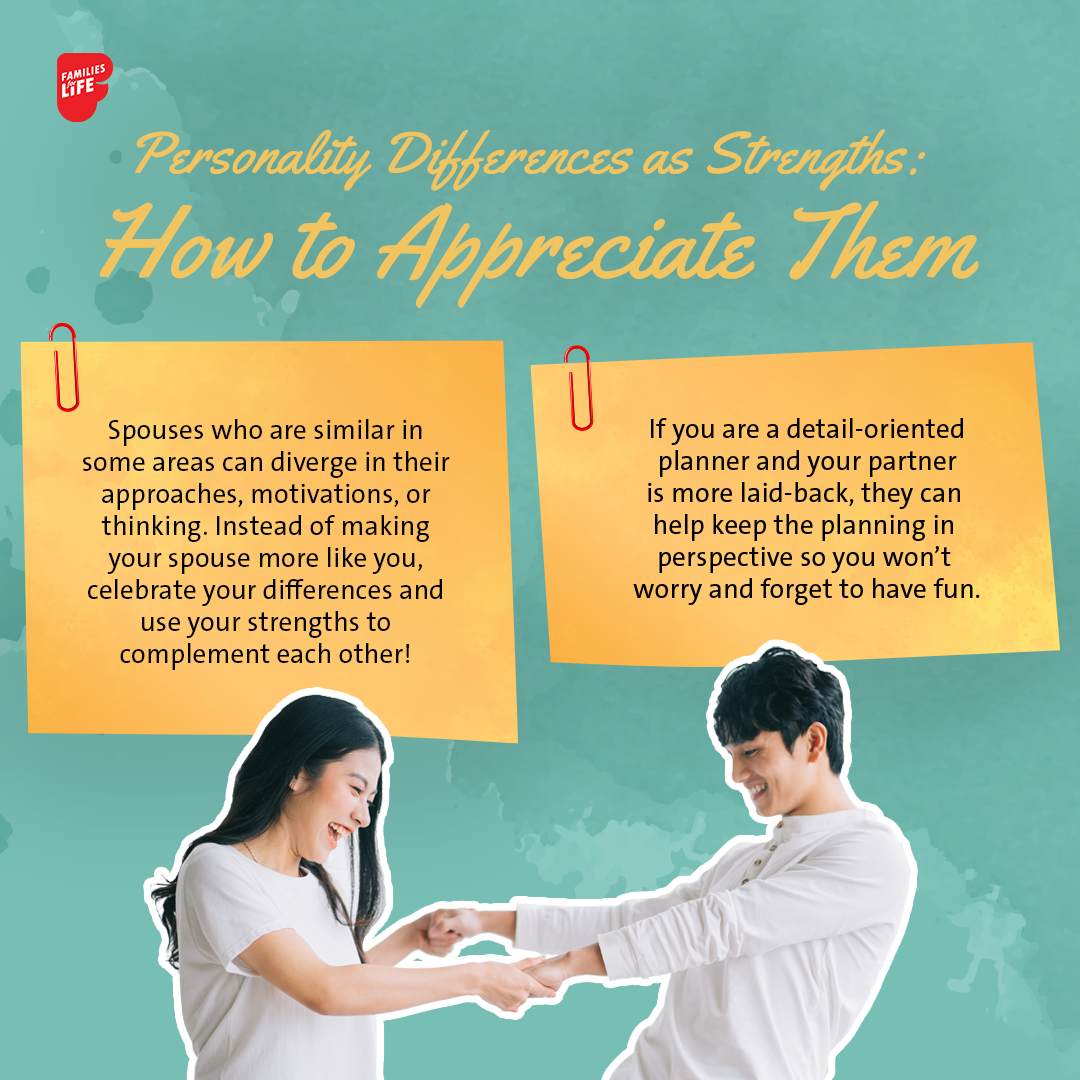Your personality is a pattern of thoughts, preferences, activities, and feelings that are uniquely yours. To make a relationship work long-term, you will need to be aware of your own personality tendencies and motivations, and understand your partner’s personality style, too!

There will be areas your personalities naturally overlap – leading to things like shared hobbies, a similar sense of humor, or common approaches to managing money. There will also be areas where your personalities clash. This can lead to differences, for example, in how you like to show affection, or how you cope with irritations like rush hour traffic or a messy kitchen.
Maybe one of you tend to be more assertive and agitated when there is a conflict at hand, and the other prefers to sweep it under the rug and avoid the issue. The partner who is more willing to engage in conflict will need to find ways to do so constructively – to assert needs and raise issues without being too aggressive. The partner who is more conflict avoidant will need to lean into the discomfort of engaging in healthy conflicts a bit more, but in a way that feels physically and emotionally safe.
When you understand your personalities well, you can develop strategies to help you handle personality clashes better, so they do not become sources of ongoing frustration in your relationship. It’s not your differences in personality that matter as much as how you handle these differences in your relationship!
Personality Differences as Strengths: How to Appreciate Them

Opposites can certainly attract! We often find the areas of differences between us intriguing. Even spouses who are quite similar in some areas tend to diverge in their approaches, motivations, or thinking on other topics. At the core, you are two different people trying to join forces to build a beautiful life together. One of the best ways to do that is to acknowledge and celebrate your differences versus trying to make your spouse more like you.
For example, if you’re a detail-oriented planner, you may admire the go-with-the-flow nature of your spouse at times. But, as you’re feverishly planning a family gathering, their laid-back nature might really push your buttons. In those moments, instead of wishing they are a super planner like you, remember your respective strengths. Your spouse can help you keep the planning in perspective so you don’t spiral into worry and anxiety and forget the fun. Regardless, your guests will appreciate and benefit from your meticulous planning to make the experience smoother and more enjoyable for everyone. Using your strengths to complement each other can be one of your greatest assets as a couple.
Personality Differences as Challenges: How To Manage Them

We can love each other deeply but drive each other crazy. Our spouses are usually not trying to irritate us, but our personality differences can sometimes frustrate one another. In some circumstances, the ways we think and operate just don’t align. When you know your spouse well, you know their fears, what makes them uncomfortable, how they process information, their deeply-held values and what makes them feel safe. It is important to keep those things top of mind, so we don’t let differences get the best of us.
For instance, if your spouse likes to get straight to the point without extra chit chat and you like to talk things through, the two of you need to come up with ground rules to handle these differences. Schedule a time to talk and try engaging the Speaker-Listener Technique. Using a structured format for the discussion might make your partner feel more comfortable, and your partner might not mind you taking a bit longer to process the topic verbally. Accommodations can be made for each of you.
When you learn to communicate with your spouse in a way they can hear and process better, you’re both able to get more of what you need from the relationship.
If you like what you read, check out other mini marriage PREP tips here!